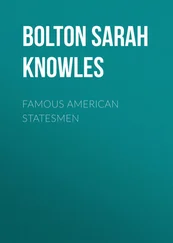Sarah Bolton - Famous Givers and Their Gifts
Здесь есть возможность читать онлайн «Sarah Bolton - Famous Givers and Their Gifts» — ознакомительный отрывок электронной книги совершенно бесплатно, а после прочтения отрывка купить полную версию. В некоторых случаях можно слушать аудио, скачать через торрент в формате fb2 и присутствует краткое содержание. Жанр: foreign_antique, foreign_prose, на английском языке. Описание произведения, (предисловие) а так же отзывы посетителей доступны на портале библиотеки ЛибКат.
- Название:Famous Givers and Their Gifts
- Автор:
- Жанр:
- Год:неизвестен
- ISBN:нет данных
- Рейтинг книги:4 / 5. Голосов: 1
-
Избранное:Добавить в избранное
- Отзывы:
-
Ваша оценка:
- 80
- 1
- 2
- 3
- 4
- 5
Famous Givers and Their Gifts: краткое содержание, описание и аннотация
Предлагаем к чтению аннотацию, описание, краткое содержание или предисловие (зависит от того, что написал сам автор книги «Famous Givers and Their Gifts»). Если вы не нашли необходимую информацию о книге — напишите в комментариях, мы постараемся отыскать её.
Famous Givers and Their Gifts — читать онлайн ознакомительный отрывок
Ниже представлен текст книги, разбитый по страницам. Система сохранения места последней прочитанной страницы, позволяет с удобством читать онлайн бесплатно книгу «Famous Givers and Their Gifts», без необходимости каждый раз заново искать на чём Вы остановились. Поставьте закладку, и сможете в любой момент перейти на страницу, на которой закончили чтение.
Интервал:
Закладка:
Famous Givers and Their Gifts
PREFACE
While it is interesting to see how men have built up fortunes, as a rule, through industry, saving, and great energy, it is even more interesting to see how those fortunes have been or may be used for the benefit of mankind.
In a volume of this size, of course, it is impossible to speak of but few out of many who have given generously of their wealth, both in this country and abroad.
The book has been written with the hope that others may be incited to give through reading it, and may see the results of their giving in their lifetime. A sketch of George Peabody may be found in "Poor Boys who became Famous;" a sketch of Johns Hopkins in "How Success is Won."
S. K. B.JOHN LOWELL, Jr.,
AND HIS FREE LECTURES
There is often something pathetic about a great gift. The only son of Leland Stanford dies, and the millions which he would have inherited are used to found a noble institution on the Pacific Coast.
The only son of Henry F. Durant, the noted Boston lawyer, dies, and the sorrowing father and mother use their fortune to build beautiful Wellesley College.
The only son of Amasa Stone is drowned while at Yale College, and his father builds Adelbert College of Western Reserve University, to honor his boy, and bless his city and State.
John Lowell, Jr., early bereft of his wife and two daughters, his only children, builds a lasting monument for himself, in his Free Lectures for the People, for all time, – the Lowell Institute of Boston.
John Lowell, Jr., was born in Boston, Mass., May 11, 1799, of distinguished ancestry. His great-grandfather, the Rev. John Lowell, was the first minister of Newburyport. His grandfather, Judge John Lowell, was one of the framers of the Massachusetts Constitution in 1780. He inserted in the bill of rights the clause declaring that "all men are born free and equal," for the purpose, as he said, of abolishing slavery in Massachusetts; and offered his services to any slave who desired to establish his right to freedom under that clause. His position was declared to be constitutional by the Supreme Court of the State in 1783, since which time slavery has had no legal existence in Massachusetts. In 1781 he was elected a member of the Continental Congress, and appointed by President Washington a judge of the District Court of Massachusetts; in 1801 President Adams appointed him chief justice of the Circuit Court. He was brilliant in conversation, an able scholar, and an honest and patriotic leader. He was for eighteen years a member of the corporation of Harvard College.
Judge Lowell had three sons, John, Francis Cabot, and Charles. John, a lawyer, was prominent in all good work, such as the establishment of the Massachusetts General Hospital, the Provident Institution for Savings in the City of Boston, the Massachusetts Agricultural Society, and other helpful projects. "He considered wealth," said Edward Everett, "to be no otherwise valuable but as a powerful instrument of doing good. His liberality went to the extent of his means; and where they stopped, he exercised an almost unlimited control over the means of others. It was difficult to resist the contagion of his enthusiasm; for it was the enthusiasm of a strong, cultivated, and practical mind."
Francis Cabot, the second son, was the father of the noted giver, John Lowell, Jr. Charles, the third son, became an eminent Boston minister, and was the father of the poet, James Russell Lowell. On his mother's side the ancestors of John Lowell, Jr., were also prominent. His maternal grandfather, Jonathan Jackson, was a generous man of means, a member of the Congress of 1782, and at the close of the Revolutionary War largely the creditor of the Commonwealth of Massachusetts. He was the treasurer of the State and of Cambridge University.
John Lowell, Jr., must have inherited from such ancestors a love of country, a desire for knowledge, and good executive ability. He was reared in a home of comfort and intelligence. His father, Francis Cabot, was a successful merchant, a man of great energy, strength of mind, and integrity of character.
In 1810, when young John was about eleven years old, the health of his father having become impaired, the Lowell family went to England for rest and change. The boy was placed at the High School of Edinburgh, where he won many friends by his lovable qualities, and his intense desire to gain information. When he came back to America with his parents, he entered Harvard College in 1813, when he was fourteen years old. He was a great reader, especially along the line of foreign travel, and had a better knowledge of geography than most men. After two years at Cambridge, he was obliged to give up the course from ill health, and seek a more active live. When he was seventeen, and the year following, he made two voyages to India, and acquired a passion for study and travel in the East.
His father, meantime, had become deeply interested in the manufacture of cotton in America. The war of 1812 had interrupted our commerce with Europe, and America had been compelled to manufacture many things for herself. In 1789 Mr. Samuel Slater had brought from England the knowledge of the inventions of Arkwright for spinning cotton. These inventions were so carefully guarded from the public that it was almost impossible for any one to leave England who had worked in a cotton-mill and understood the process of manufacture. Parliament had prohibited the exportation of the new machinery. Without the knowledge of his parents, Samuel Slater sailed to America, carrying the complicated machinery in his mind. At Pawtucket, R.I., he set up some Arkwright machinery from memory, and, after years of effort and obstacles, became successful and wealthy.
Mr. Lowell determined to weave cotton, and if possible use the thread already made in this country. He proposed to his brother-in-law, Mr. Patrick Tracy Jackson, that they put some money into experiments, and try to make a power-loom, as this newly invented machine could not be obtained from abroad. They procured the model of a common loom, and after repeated failures succeeded in reinventing a fairly good power-loom.
The thread obtained from other mills not proving available for their looms, spinning machinery was constructed, and land was purchased on the Merrimac River for their mills; in time a large manufacturing city gathered about them, and was named Lowell, for the energetic and upright manufacturer.
When the war of 1812 was over, Mr. Lowell knew that the overloaded markets of Europe and India would pour their cotton and other goods into the United States. He therefore went to Washington in the winter of 1816, and after overcoming much opposition, obtained a protective tariff for cotton manufacture. "The minimum duty on cotton fabrics," says Edward Everett, "the corner-stone of the system, was proposed by Mr. Lowell, and is believed to have been an original conception on his part. To this provision of law, the fruit of the intelligence and influence of Mr. Lowell, New England owes that branch of industry which has made her amends for the diminution of her foreign trade; which has left her prosperous under the exhausting drain of her population to the West; which has brought a market for his agricultural produce to the farmer's door; and which, while it has conferred these blessings on this part of the country, has been productive of good, and nothing but good, to every other portion of it."
At Mr. Lowell's death he left a large fortune to his four children, three sons and a daughter, of whom John Lowell, Jr., was the eldest. Like his father, John was a successful merchant; but as his business was carried on largely with the East Indies, he had leisure for reading. He had one of the best private libraries in Boston, and knew the contents of his books. He did not forget his duties to his city. He was several times a member of the Common Council and the Legislature of the State, believing that no person has a right to shirk political responsibility.
Читать дальшеИнтервал:
Закладка:
Похожие книги на «Famous Givers and Their Gifts»
Представляем Вашему вниманию похожие книги на «Famous Givers and Their Gifts» списком для выбора. Мы отобрали схожую по названию и смыслу литературу в надежде предоставить читателям больше вариантов отыскать новые, интересные, ещё непрочитанные произведения.
Обсуждение, отзывы о книге «Famous Givers and Their Gifts» и просто собственные мнения читателей. Оставьте ваши комментарии, напишите, что Вы думаете о произведении, его смысле или главных героях. Укажите что конкретно понравилось, а что нет, и почему Вы так считаете.












